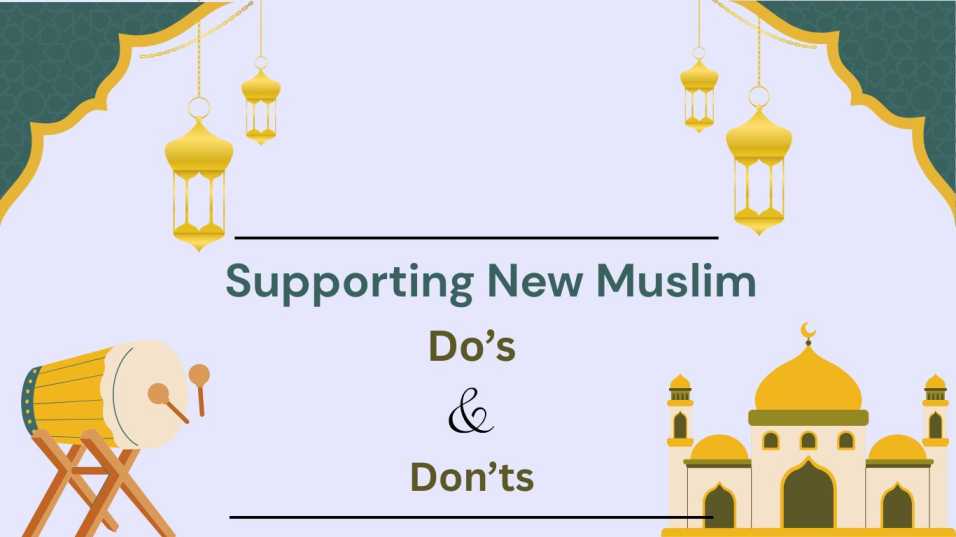Supporting New Muslims: Do and Dont
When someone embraces Islam, it marks the beginning of a beautiful, transformative journey. But it can also be a time filled with uncertainty, isolation, and overwhelming change. Supporting new Muslims isn’t just a kind gesture — it’s a communal obligation. The early days after taking shahadah are crucial, and how we treat our brothers and sisters during this time can shape their entire spiritual path.
If you’re wondering how to offer meaningful support, this guide will walk you through the dos and don’ts of supporting new Muslims, drawing from compassion, real-life experiences, and the wisdom of the Prophet Muhammad ﷺ.
Why Supporting New Muslims Matters
Imagine leaving behind parts of your old life — habits, social circles, sometimes even family ties — to follow what you believe is the truth. That’s what many new Muslims face. Some are euphoric and hopeful, others feel scared, alone, or overwhelmed by the unfamiliarity of Islamic practices.
Supporting new Muslims means giving them more than a “Masha’Allah” and a hug after shahadah. It means walking with them — patiently and consistently — through their spiritual, emotional, and even practical challenges.
The Dos of Supporting New Muslims

✅ 1. Stay Connected Consistently
When someone becomes Muslim, they’re often showered with love and attention on Day 1. But what happens on Day 30? Or Day 300?
A major aspect of supporting new Muslims is showing up regularly. Call them. Invite them to events. Ask how their prayers are going. Let them know they haven’t been forgotten.
✅ 2. Offer a Judgement-Free Learning Space
Islam has layers of knowledge that even lifelong Muslims continue to explore. So imagine how overwhelming it can be for someone brand new.
Instead of bombarding them with “do this” and “don’t do that,” supporting new Muslims means encouraging slow, steady learning. Let them ask “basic” questions without fear of judgment — even if it’s something like, “Can I pray in English?” or “Why do Muslims fast?”
✅ 3. Teach by Example, Not Just Lecture
The Prophet ﷺ didn’t just teach Islam — he lived it. Likewise, supporting new Muslims involves being a living example of patience, kindness, humility, and forgiveness.
Rather than preaching endlessly, show what a practicing Muslim looks like through your behavior. Invite them to pray with you. Let them see how you handle stress, disagreements, or blessings.
✅ 4. Include Them in Social and Religious Activities
New Muslims often feel left out of both their old communities and their new one. You can change that.
If you’re hosting an iftar, make room for them at your table. Invite them to Eid celebrations, halaqas, or even casual outings. Supporting new Muslims means making them feel like they truly belong.
✅ 5. Help Them Navigate Cultural Differences
Islam is a universal faith, not a cultural club. Many new Muslims feel pressured to adopt foreign cultural practices that aren’t necessary.
Part of supporting new Muslims is clarifying what’s Islamic and what’s cultural. Let them know it’s okay to remain themselves — so long as they uphold Islamic values. Encourage healthy identity integration, not replacement.
The Don’ts of Supporting New Muslims
❌ 1. Don’t Expect Immediate Perfection
Becoming Muslim doesn’t instantly erase years of habits and experiences. Some new Muslims may still struggle with alcohol, dating, or missing prayers.
Supporting new Muslims means understanding that Islam is a journey, not a flip-switch. Avoid harsh judgments. Offer encouragement and remember that everyone has a unique path.
❌ 2. Don’t Overload Them with Information
Yes, knowledge is important — but too much, too soon can be counterproductive. Dumping volumes of fiqh or sending dozens of YouTube links isn’t helpful if it causes anxiety or confusion.
Stick to the essentials. Supporting new Muslims involves prioritizing foundational beliefs and actions, like tawheed, salah, and purification. Let them grow at a sustainable pace.
❌ 3. Don’t Assume Their Needs
You may think a new Muslim needs a Qur’an translation, but maybe they need rent money, or help breaking difficult news to their family.
Ask. Listen. Be present. Effective supporting of new Muslims begins with understanding their actual situation, not making assumptions.
❌ 4. Don’t Isolate Them Based on Gender
It’s common for brothers to support brothers and sisters to support sisters — and this makes sense for certain discussions. But sometimes, new Muslims fall through the cracks because “nobody from their gender” is available to help.
Supporting new Muslims means making exceptions when needed — within the boundaries of Islamic etiquette. If you’re a brother who knows a sister revert with no support, connect her with trusted women in your community, even if you can’t mentor her directly.
❌ 5. Don’t Use Complex Arabic or Religious Jargon
Saying things like “make tawbah for your sins before Yawm al-Qiyamah” can be confusing for someone who doesn’t yet know those terms.
Supporting new Muslims involves keeping your language simple and approachable. Explain new terms as they come up. Use analogies or relatable stories. Speak to them, not above them.
Bonus Tips for Supporting New Muslims
-
Create support groups: Whether it’s online or local, having a safe space to ask questions and share experiences can be life-changing.
-
Give practical tools: A prayer mat, a translated Qur’an, or even a beginner’s guide to Islam can help a lot more than abstract lectures.
-
Check in after major holidays: Many new Muslims feel lonely on Christmas or birthdays, especially if they’ve left close family ties behind. A quick message or visit goes a long way.
-
Remind them of Allah’s mercy: Everyone makes mistakes. Reassure them that Allah loves those who turn back to Him.
Real Stories, Real Impact
Fatima, a revert from Canada, shared how the kindness of one sister kept her in Islam:
“I was so close to giving up because I felt like I’d never be a ‘real’ Muslim. But one sister just kept inviting me to things and texting me. She didn’t judge me when I slipped up. That saved my faith.”
This is what supporting new Muslims can look like: quiet acts of love that echo into eternity.
In Conclusion: Let’s Be Their Bridge, Not Their Barrier
Being part of someone’s journey to Allah is a huge honor — and a responsibility. Supporting new Muslims doesn’t require scholarly knowledge or a perfect character. It just needs sincerity, patience, and a willingness to walk beside someone who’s trying their best.
So the next time someone takes shahadah in your masjid or community, don’t let it end with applause. Let it begin with real support. Consistent, kind, and informed support.
Because when we uplift them, we’re not just supporting new Muslims — we’re strengthening the entire ummah.
For more blogs Adab with Parents According to the Quran -2025

